We firmly believe that music is an integral part of our spiritual lives
The universal language of music helps to deepen our faith, affirm our beliefs, inspire us to action, and build community.
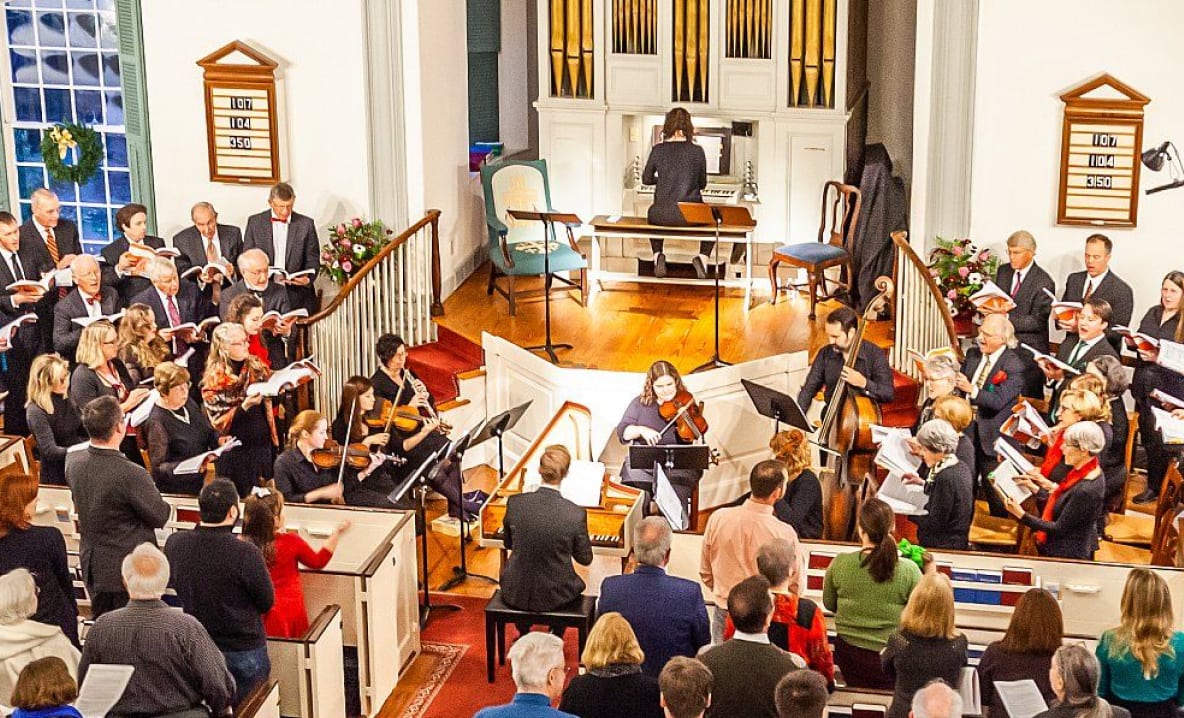
The Meeting House is proud to have a distinguished history of quality music and is committed to offering musical opportunities for all to serve. From preschool to more seasoned adults, we have several choirs and instrumental groups that help enhance worship and serve the greater community through concerts and outreach.
Learn more about Music
at The Meeting House
Please browse to learn about our various choirs and our two incredible mechanical-action pipe organs.
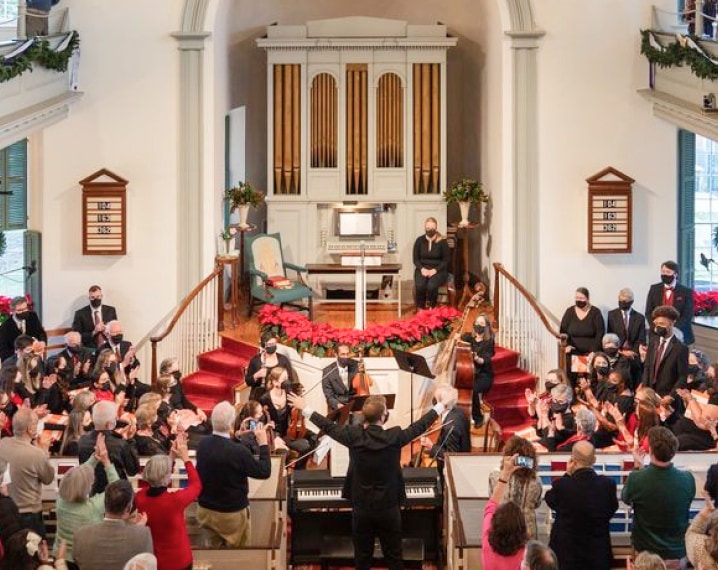
Choirs
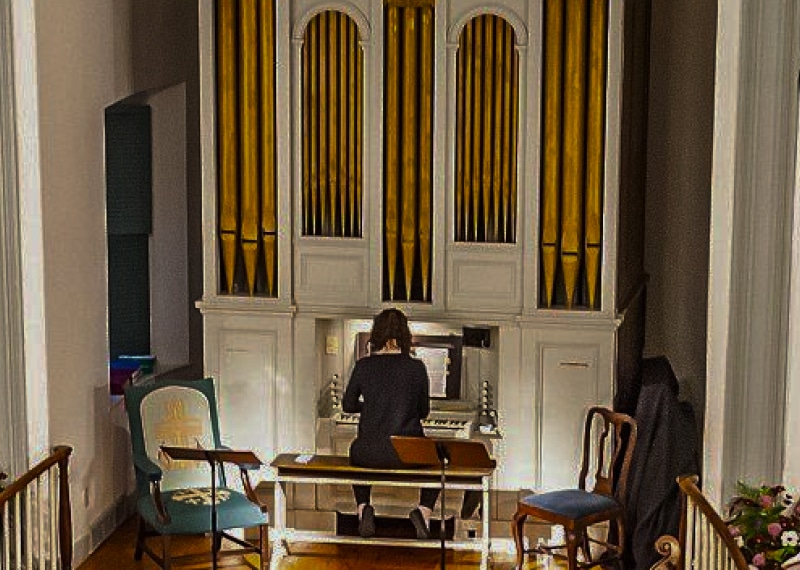
Organs
Choirs
For information about participating in the music program
Contact Dr. Bryan Holten, director of music, or the director listed with each individual choir.
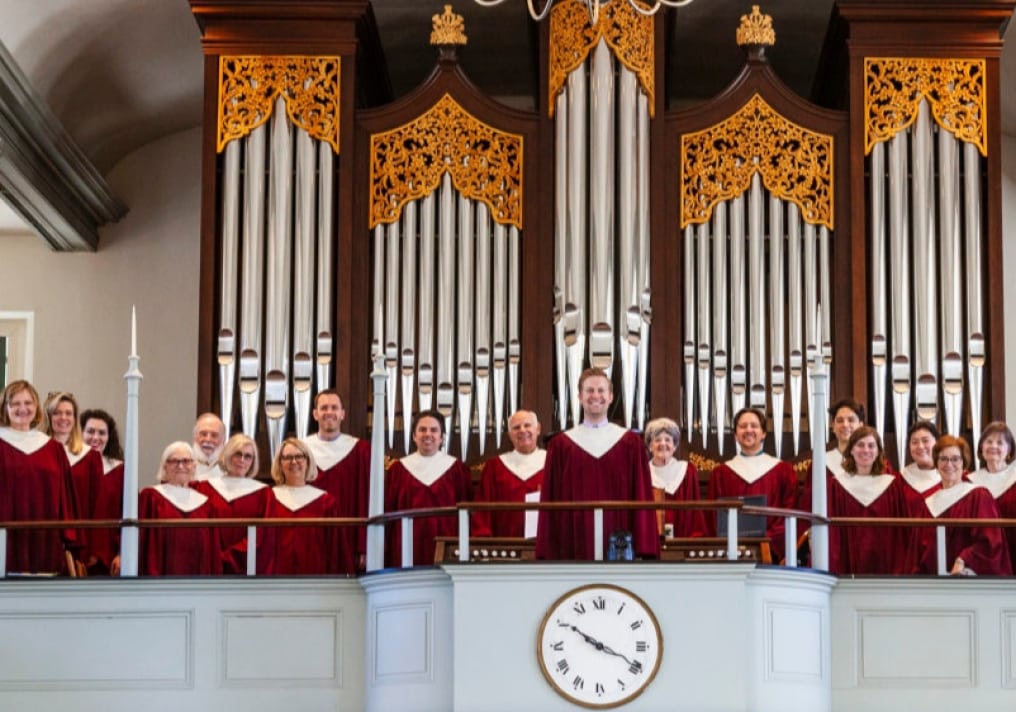
Adult Choir
The Adult Choir leads the music during Sunday worship services from September through May and at special services throughout the year. Our repertoire spans from the earliest chants to newly-composed sacred music, and everything in between.
September‒May: Biweekly Thursday rehearsals from 7:30–9:00 PM.
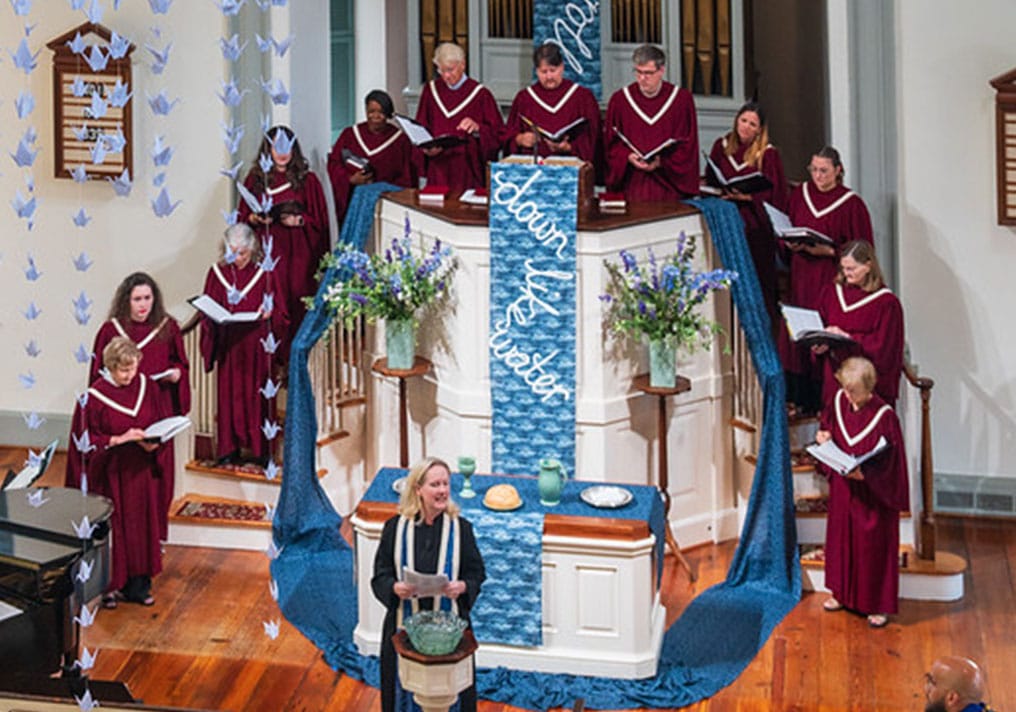
Meeting House Singers
Meeting House Singers is a chamber choir of eight to twelve auditioned singers drawn from the Adult Choir who sing on an occasional basis at Sunday morning services. Rehearsals are held as needed in conjunction with the Adult Choir.
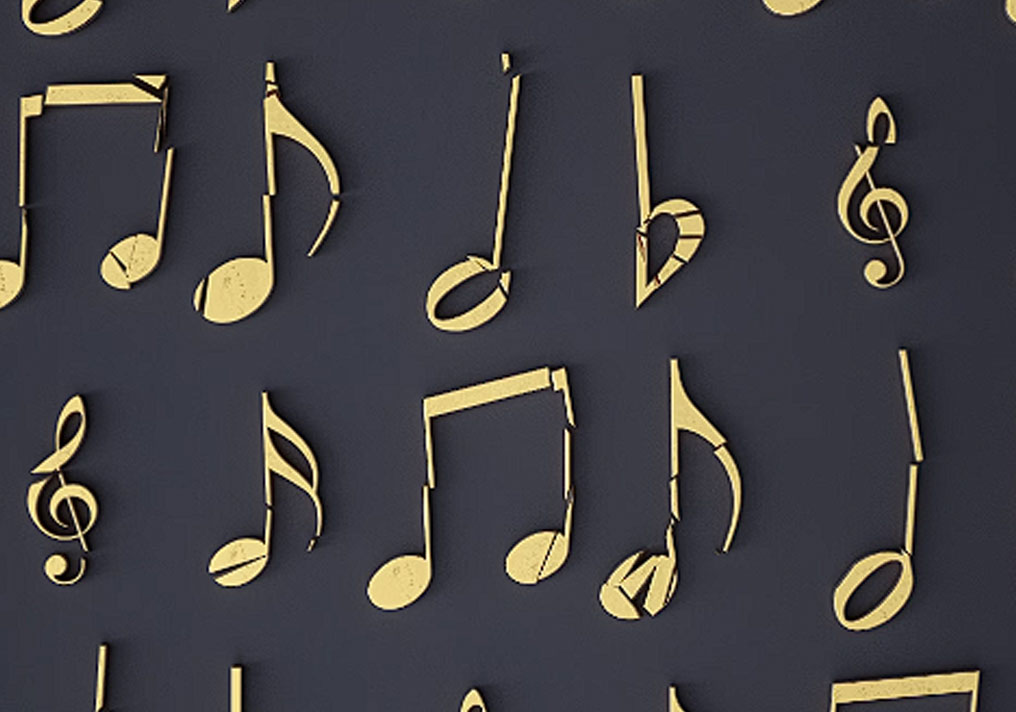
Cherub Music Group
Age 3 through Kindergarten
They meet from 9:30–9:50 AM each Sunday throughout the program year. Faith formation and music making come together in fun ways as our youngest children gather to sing. The Cherub Music Group sings occasionally for Sunday morning worship services and at the Christmas Eve family service.
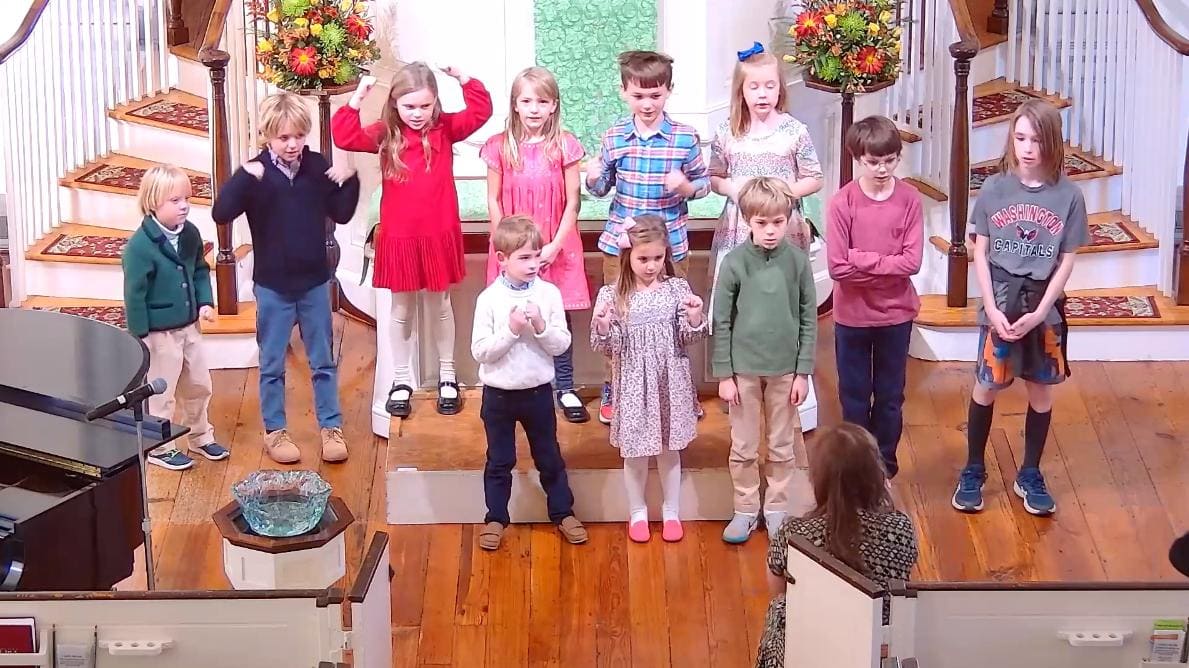
Covenant Music Group
Grades 1 through 5
They meet from 9:30–9:50 AM each Sunday throughout the program year. This choir begins to explore liturgy, hymnody, and choral singing in ways that relate to grade-school choristers. The Covenant Music Group sings occasionally for Sunday morning worship services and at the Christmas Eve family service.
Organs at the Meeting House
Prior to the installation of the church’s first pipe organ, congregational singing and chanting of psalms was unaccompanied or supported by a string instrument.
In 1817, Jacob Hilbus and Henry Harrison of Washington, DC built and installed the church’s first organ. This organ was destroyed in the 1835 fire and was replaced in 1849 by an organ built by Henry Erben of New York City, which was installed in the apse behind the pulpit. This organ was relocated to the rear balcony in 1927. The Reuter Organ Company of Lawrence, Kansas installed an organ on either side of the Erben in 1965. In 1997, the Erben organ was returned to its original location in the apse, the Reuter organ was donated to a local congregation, and a new instrument by Lively-Fulcher Organ Builders was installed in the rear balcony.
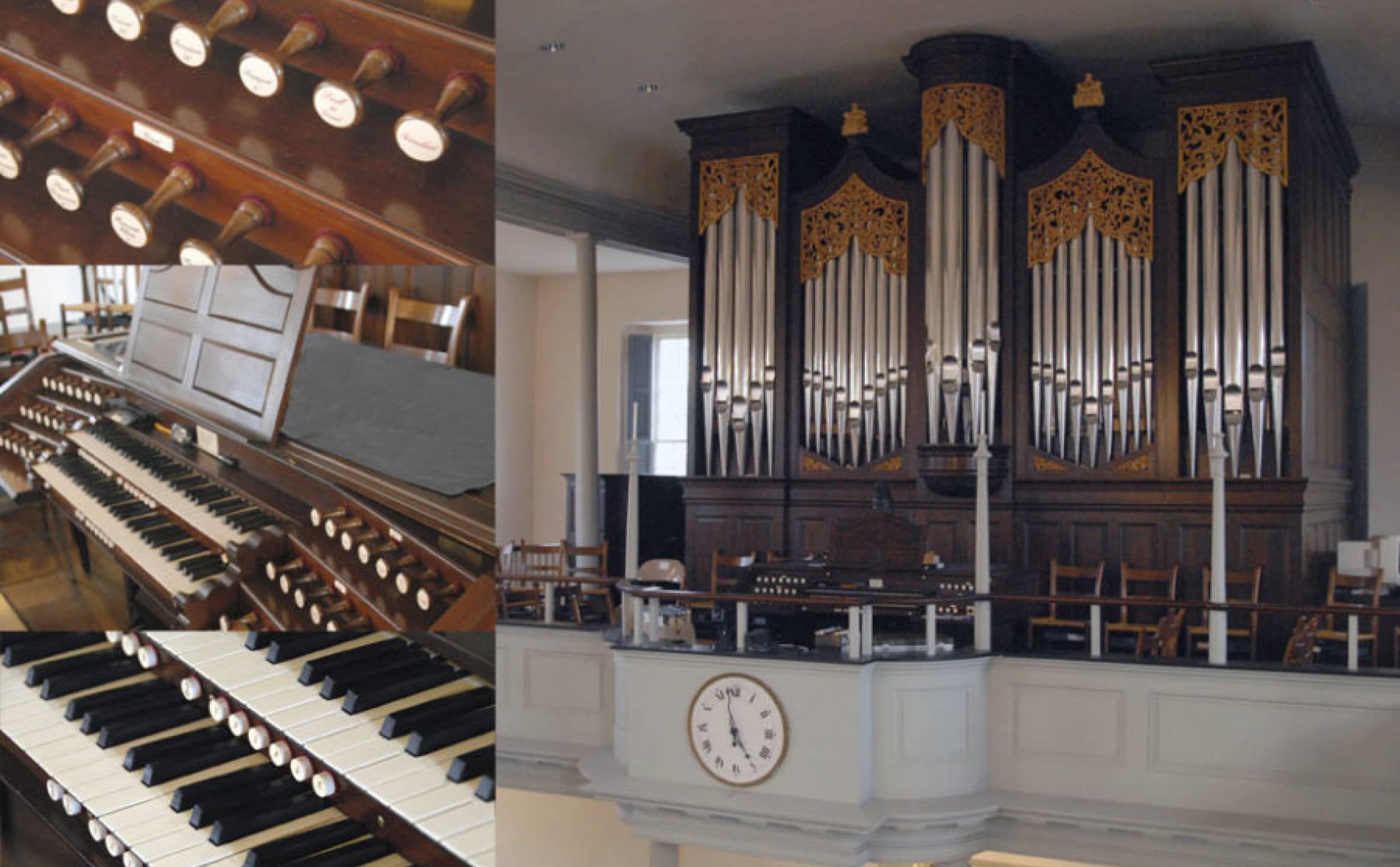
Lively-Fulcher Organ Builders, 1997 (Balcony)
Mark Lively and Paul Fulcher have each been building organs for more than thirty years. Their goal is simply stated: To build a small number of organs, one at a time, that are of the highest artistic quality using the finest materials available.
Mark Lively has studied music, art, history, and electrical engineering. In 1976 he established the first company in the United States to utilize Computer Aided Design (CAD) in the construction of pipe organs. In 1989 he became Tonal Director of the venerable English firm of J. W. Walker and Sons. Subsequently, he was appointed Artistic Director.
Paul Fulcher, a native of England, studied piano from an early age. His training in organ building includes a formal English apprenticeship program with J. W. Walker specializing in the voicing of pipes. He worked at Walker and Sons for twenty years, eventually becoming Head Voicer and Joint Tonal Director with Mark Lively. During this period, Lively and Fulcher were responsible for building and voicing scores of organs all over the world.
Now having joined forces as partners in the US, the Lively-Fulcher organ in the Meeting House (Opus 4) has mechanical key action with a detached console and electric stop action. The mahogany case features polished tin façade (front) pipes with carved pipe shades. The organ has 31 stops, 35 ranks, and 2026 pipes.
| 16′ | 8′ | 8′ | 8′ | 8′ | 4′ | 22/3 | 22/3′ | 2′ | 11/3' | 8′ |
|---|---|---|---|---|---|---|---|---|---|---|
| Bourdon | Open Diapason | Stopt Diapason | Harmonic Flute | Principal | Open Flute | Twelfth | Cornet III | Fifteenth | Furniture IV | Open Diapason |
| 49 pipes/12 from PD 16 Subbass | 61 pipes | 61 pipes | 49 pipes/ 12 from GT Stopt flute) | 61 pipes | 61 pipes | 61 pipes | 183 pipes | 61 pipes | Trumpet | 61 pipes |
Swell to Great Tremulant
| 8′ | 8′ | 8′ | 8′ | 4′ | 4′ | 2 2⁄3‘ | 2′ | 1 1⁄3‘ | 1′ | 16′ | 8′ |
|---|---|---|---|---|---|---|---|---|---|---|---|
| Diapason | Chimney Flute | Salicional | Voix Celeste | Principal | Tapered Flute | Sesquialtera II | Flageolet | Larigot | Mixture III | Bassoon | Hautboy |
| (61 pipes) | (61 pipes) | (61 pipes) | (49 pipes) | (61 pipes) | (61 pipes) | (122 pipes) | (61 pipes) | (61 pipes) | (183 pipes) | (61 pipes) | (61 pipes) |
Tremulant
| 32′ | 16′ | 16′ | 8′ | 8′ | 4′ | 16′ | 8′ |
|---|---|---|---|---|---|---|---|
| Contra Bourdon | Open Diapason | Subbass | Principal | Bass Flute | Fifteenth | Trombone | Trumpet |
| (digital) | (32 pipes) | (32 pipes) | (32 pipes) | (12 pipes) | (12 pipes) | (32 pipes) | (12 pipes) |
Great to Pedal
Swell to Pedal
Zimbelstern
Henry Erben, 1849 (Apse)
Henry Erben, born in 1800, was son of Peter Erben, a distinguished New York City organist of Trinity Church. At the age of seventeen, he was apprenticed to organ builder Thomas Hall, and by 1821 was a partner in the company. Upon his death, Hall’s name was dropped from the company and business for Erben was most promising. By 1845, 153 instruments had been built including six located outside the United States. From 1847 to 1863, a branch facility was maintained in Baltimore MD for the distribution of organs to the South. When Erben died in May 1884, his obituary in the New York Tribune stated that he had built 1734 organs in his career.
The Erben organ at the Meeting House is a reflection of English organs of the period. Eight-foot stops are divided on a single manual. A pedal stop was added a few years after its 1849 installation; in 1997 the pedal board and pedal bourdon were removed into storage.*

| 8′ | 8′ | 8′ | 4′ | 4′ | 2′ | 8′ | 16′ | |
|---|---|---|---|---|---|---|---|---|
| Open Diapason | Stopt Diapason | Dulciana | Principal | Flute | Piccolo | Trumpet | Manual/Pedal Coupler* | Bourdon* |
Instrumental Ensembles
Tristique iaculis facilisi non.
Lorem ipsum dolor sit amet consectetur. Imperdiet egestas in nibh amet volutpat et id placerat cras est nec elit posuere cursus tristique iaculis facilisi non.
Other musical resources
Tristique iaculis facilisi non.
Lorem ipsum dolor sit amet consectetur. Imperdiet egestas in nibh amet volutpat et id placerat cras est nec elit posuere cursus tristique iaculis facilisi non.
Music
We're Glad You're Here
Next Worship Services: Sunday 8:30 AM or 11:00 AM
